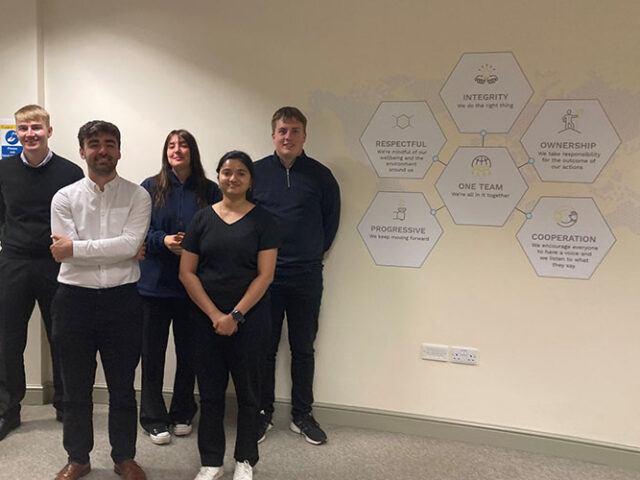In Octopus Ventures’ latest report, the University of Dundee has been named as the top university for spin-out success.
This ranking was determined by factors such as patents, spin-outs created and recent portfolio success, which for Dundee, included the £2.2 billion IPO of Exscientia on the US NASDAQ, one of the largest ever UK university exits.
Gateways to Growth: The Entrepreneurial Impact Report for 2023 was released by Octopus Ventures, a part of Octopus Investments, one of the largest and most active venture capital investors in Europe. It is a follow-on report from the 2020 edition, which ranks universities based on their success at commercialising and ‘spinning out’ deep tech companies.
Dr David McBeth, Vice-Principal (Enterprise & Economic Transformation) for the University of Dundee, said: “This recognition from Octopus Ventures is fantastic news and a testament to the many years of hard work undertaken to create a thriving entrepreneurial culture here at the University of Dundee.”
“The main foundations of our success are world-leading life and biomedical sciences research, and innovative researchers. At a time when there is a lot of chatter about standardising spin-out arrangements, we pride ourselves on fostering great relationships with investors and founding teams, and treating each company according to its individual circumstances.”
Spin-outs are an important way in which research moves from the academic sphere into everyday lives and UK universities are vital in creating an environment in which they can thrive. Businesses are formed when the technologies developed within a university environment are ‘de-risked’ to the point they transition from ‘research’ to ‘development’. Spin-outs are then proven successful if they deliver step change transformational technology.
This year’s report found that 60% of the top ten performers are based outside the Golden Triangle; the triangle formed by the university cities of Cambridge, London, and Oxford. This highlights the breadth of academic strength across the UK and the potential for deep tech innovation to form part of the broader levelling up agenda, such as accelerating job creation and economic growth. Queen’s University Belfast is one such example of this, with the institution being regarded as a pillar of the innovation community and with its commitment to commercialisation, leading them to recently announce its 100th spin-out.
Dr Amy Nommeots-Nomm, Deep Tech Investor, Octopus Ventures commented: “Congratulations to the University of Dundee, it’s great to see them move up the rankings to take the number one spot and prove its status as a leader in the deep tech space.
“Deep tech companies have the potential to address some of the world’s greatest challenges, such as climate change and resource scarcity. Since our last report, the race to tackle Covid-19 highlighted the power of academic institutions to mobilise quickly and develop solutions which transform millions of lives. Sustained funding for research and innovation, and consistent support for spin outs is vital if the UK’s universities are to continue generating globally impactful technologies.”
Despite obvious success from universities across the UK, the current environment is still turbulent. For deep tech businesses to succeed, long-term support and vision are needed. The UK academic community was heavily affected by Brexit, with many European funded research grants and Regional Development Funds ending. Other factors of contention include:
- The ‘great resignation’: based on estimates in a report from the University and College Union (UCU) titled “UK Higher Education: A workforce in crisis”, 60% of its members are likely to leave the university ecosystem within the next five years.
- A period of uncertainty: during the COVID-19 years, all non-COVID focused research labs were forced to close, halting experiments and progression by three to six months.
- Availability of space: deep tech spin-outs require innovative infrastructure. Currently, there is a lack of lab space for institutions across the UK, and prevalent both inside and outside of the Golden Triangle, where founders are voicing their concerns of not being able to scale as they grow.
- Availability of capital: there’s a lack of funds to hire and retain technology transfer staff and there needs to be more translational funding to bridge the gap between research and spin-out.
- More than just equity: equity stakes taken by academic institutions is not the only factor which influences spin-out success. For example, the time from ideation to spin-out needs to be shortened and ecosystems filled with support from angels and advisors must be fostered.
Zoe Reich, General Partner of the Octopus Investments pre-seed deep tech fund, commented: “While spin-outs are faced with a complicated ecosystem, during the research stages of the report we were pleased to find that a number of institutions are working to identify and fix the current challenges.
“For example, we’ve seen a rise in the amount of capital available to invest in spin-outs. Northern Gritstone’s £250 million mandate to deploy capital across spin-outs from Manchester, Leeds, and Sheffield, and Mindforge’s intention to raise a fund to deploy across the Midlands, are exciting developments. In July, we also saw the announcement from the UK Government that it will unlock 5% of UK pension capital for investment into high growth companies. It’s reassuring to see that capital is being raised with the specific mandate of supporting the growth and success of spin-outs in the UK.”




